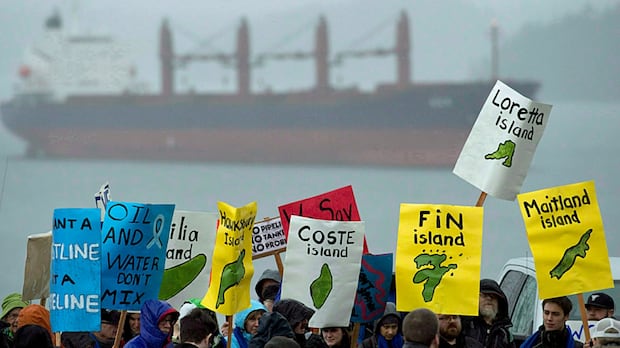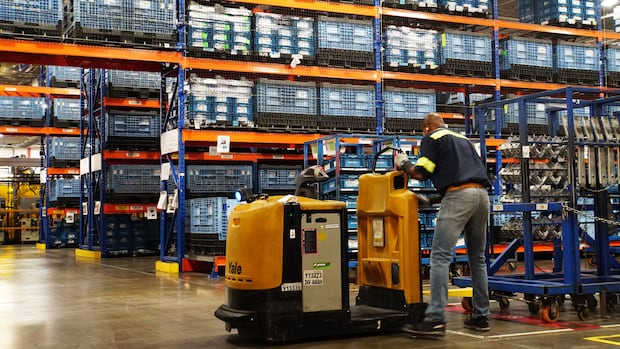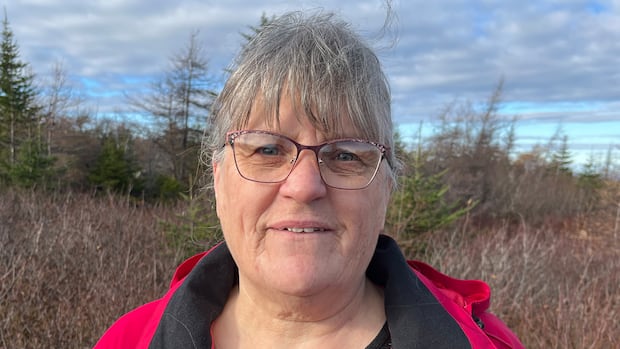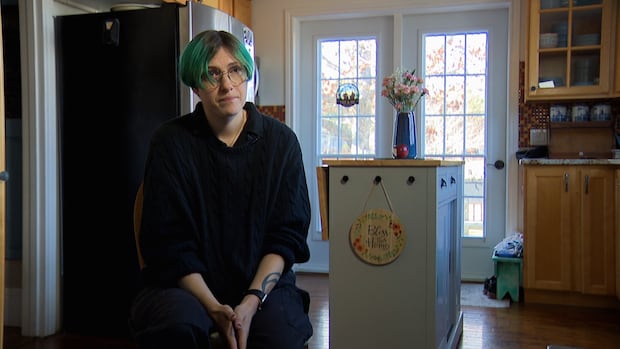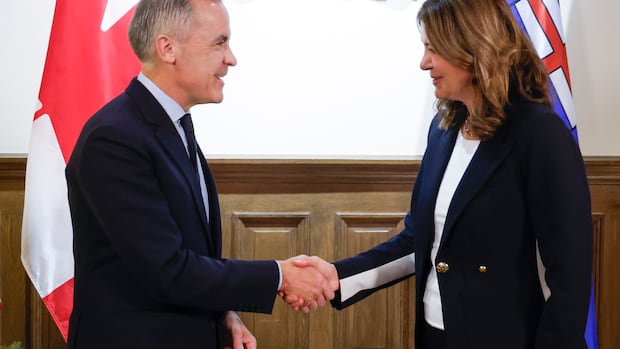Prime Minister Mark Carney and Alberta Premier Danielle Smith have jointly agreed on a path forward for a new bitumen pipeline to the B.C. coast — a hugely significant development that the federal government is framing as a chance to further develop Alberta's energy sector, diversify Canada's economy and lessen dependence on the U.S.
The deal turns the page on a decade of acrimony between Alberta and Ottawa and secures the Prairie province's commitment to enact a higher industrial carbon levy on emissions and help build a major carbon-capture project that's designed to drive down greenhouse gases associated with the oilpatch.
"That's going to make Canada stronger, more independent, more resilient, more sustainable," Carney said at the signing ceremony in Calgary.
"This is a great day for Albertans," added Smith.
The deal was however a bridge too far for Liberal MP Steven Guilbeault, who resigned from Carney's cabinet citing the government's backsliding on some climate commitments as an intolerable development that demanded his departure. Guilbeault said he would stay on as a Liberal MP.
The centrepiece of this memorandum of understanding (MOU) is an agreement by Ottawa to help facilitate the construction of a pipeline that will carry a million barrels of oil a day from Alberta's oil patch to an export terminal on the Pacific coast, where that product will be shipped mostly to energy-hungry Asian markets.
The agreement stresses that this pipeline will be privately constructed and financed — unlike the publicly-owned Trans Mountain — and the intention is to have some Indigenous co-ownership.
Ottawa is prepared to designate this pipeline as a project of "national interest," which triggers powers under the Building Canada Act which Carney's government passed in June.
That designation means the pipeline — and possibly the tankers associated with transporting the oil — could be exempted from some federal laws. Those include the Fisheries Act, the Species At Risk Act and the Impact Assessment Act.
Once some Indigenous consultation and negotiations with B.C. take place, Alberta, as the current proponent of this pipeline, will present its plan for the pipeline to the Major Projects Office (MPO) for expedited review by July 1.
Canada is committing to "collaborate with Alberta to provide a clear and efficient approval process for the Alberta bitumen pipeline," according to the MOU.
Importantly, Alberta is promising in turn to "collaborate with B.C. to ensure British Columbians share substantial economic and financial benefits of the proposed pipeline."
According to an Alberta official who spoke to reporters at a background briefing, the intention is to get shovels in the ground on this project by 2029.
'We will build big, we will build fast'Carney said the decision to press ahead with this controversial pipeline was driven by a desire to show Canadians this country can still build big things — something he suggested didn't happen under his recent predecessors.
He also said he wants to meaningfully expand one of the country's main economic growth engines at a time when workers and businesses are under threat due to U.S. tariffs.
"We used to explore in this country, we will chart new courses again," Carney said. "We used to build in this country. We will build big, we will build fast, we will build bold again. We used to take risks in this country. We will step up to the plate again.
"It's our country; it's our future. We're taking back control to build Alberta strong, to build Canada strong," Carney said during an afternoon speech to the Calgary Chamber of Commerce, which twice drew standing ovations from the crowd — an unusual sight for a Liberal prime minister in Alberta.
WATCH | Carney asked if he's willing to approve a pipeline even if B.C., First Nations don't agree:Prime Minister Mark Carney says the agreement signed Thursday between the federal government and Alberta is 'the first step' and added that several things have to happen before a pipeline is built, including a private sector proponent and 'full partnership including equity ownership' with Alberta and B.C. First Nations and the province of B.C.Smith said Thursday was a monumental day for her province — and this agreement with Ottawa signals a break from an "extremely difficult time for hundreds of thousands of Albertans" who rely on the energy industry for their livelihoods.
She said many Albertans have questioned the "long-term viability of our nation" given what the last Liberal government did to tie up development.
'A new starting point'Now, “this is a new relationship, a new starting point” with a prime minister who cares about Alberta’s prosperity, Smith said.
She said the Trudeau era was "dark times" because it seemed like Alberta's natural wealth would be "trapped and wasted" and now, with Carney, the federal government has agreed to "cease their attempts to throttle our energy industry."
Echoing Carney's contention that a new pipeline will help the country diversify economically, Smith said Carney's decision to go forward with a new pipeline will reduce Canada's dependence on the U.S. market.
According to the Canadian Energy Regulator, 93 per cent of Canada's total oil exports went to the U.S. in 2024, which makes Alberta's oil patch in particular reliant on the whims of the Americans.
Asked about whether Albertans can really trust a Liberal prime minister to follow through on a commitment to develop the province's energy sector, Smith said Carney and others have had to "recalibrate" their thinking on conventional energy.
"We will trust but we will verify," Smith said of Carney and the federal government. "We have to proceed somewhere with a measure of good faith."
'Energy vampire'In B.C., meanwhile, Thursday's announcement was met with a wall of opposition that could stymie this project if not resolved.
The province's NDP premier, David Eby, said no private sector proponent has actually stepped forward to build a pipeline like this — and some Indigenous peoples are diametrically opposed.
Eby said he’s worried that a new project proposal would serve as an “energy vampire” that will distract Ottawa from projects that are shovel-ready and already have private proponents.
"The part where I’m going to get my elbows up is when this conversation about these non-existent projects begins to actively compromise active projects in British Columbia," he said.
"We cannot afford to lose real projects in the name of politics right now," he said, while alleging Smith is only pushing this pipeline now to secure her future as United Conservative Party leader.
Coastal First Nations, an alliance of nine First Nations opposed to a pipeline to the B.C. coast, released a statement Thursday saying the proposed pipeline could lead to spills, and it simply won't stand for this development.
"There is no technology that can clean up an oil spill at sea or in a salmon river, and there is nothing in this MOU that overrides our inherent constitutional authority and stewardship responsibilities.
"We have zero interest in co-ownership or economic benefits of a project that has the potential to destroy our way of life and everything we have built on the coast."
WATCH | 'The MOU does not contain a veto,' says Smith on B.C., Indigenous support for pipeline:When asked about the power of B.C. or a First Nation to veto a potential pipeline deal, Alberta Premier Danielle Smith responded that there is a 'requirement for consultation' and 'an imperative for Indigenous ownership.' Smith added she did speak to B.C. Premier David Eby last night said 'there’s lots in the agreement that we can focus on together.'When asked about B.C.’s opposition to a pipeline to the West Coast, Smith stressed that her agreement with Ottawa doesn’t grant Eby’s government a “veto” over the project. She said it would be "imperative" to give Indigenous peoples an ownership stake in the pipeline to try and secure some consent.
Higher industrial carbon priceIn addition to its commitment on a pipeline, Ottawa will also suspend the proposed federal oil and gas emissions cap and Alberta's requirements under the Clean Electricity Regulations (CER).
But the two sides have agreed to increase the industrial carbon price in the province — moving it from $95 a tonne now to a minimum of $130 a tonne. The federal government had previously demanded that price rise to $170 a tonne by 2030.
Both sides say they are still committed to net-zero by 2050, even though the MOU has the potential to turbocharge conventional energy production.
“We are going to get to our greenhouse gas objectives, our climate objectives only through massive investment and so we need agreements like this in order to drive that massive investment,” Carney said.
To help achieve that goal, both Canada and Alberta are moving ahead with Pathways Plus, an Alberta-based carbon capture, utilization and storage project, which could reduce the emissions intensity of exports from the province's oilsands. That has the potential to be the largest such project in the world.
The two sides are also agreeing to dramatically lower methane emissions associated with the oil patch — a 75 per cent reduction target relative to 2014 emissions levels by 2035.
Environmental groups decry dealStill, a number of environmental groups reacted negatively to the news with the David Suzuki Foundation saying that the deal is a “devastating blow to climate and nature.”
“The federal government can’t claim to respect its climate commitments under international law while underwriting fossil fuel expansion that locks Canada into decades of avoidable emissions,” said the foundation’s climate director Sabaa Khan.
Environmental Defence said the MOU is a blow to Canada’s climate ambitions and “a gift to the oil industry and Alberta Premier Smith, at the expense of practically everyone else."
Rick Smith, President of the Canadian Climate Institute said the MOU’s carve-out for Alberta on the Clean Electricity Regulations could trigger a race to the bottom on climate policy.
Conservative Leader Pierre Poilievre dismissed the MOU, saying a pipeline would be approved by a Conservative federal government immediately.
“Prime Minister Mark Carney stands in the way of it all, with federal rules and taxes that drive production out, paycheques down and cost of living up,” he said.
“Today’s memorandum does not promise a pipeline will be built," Poilievre added. “It promises that seven months from now, a pipeline proposal will be referred to a federal office for two further years of study.”
But at least one Conservative MP was encouraged.
"If the premier is happy, I'm happy," said Calgary MP Stephanie Kusie.


